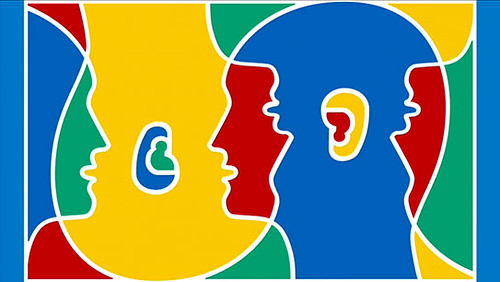 Seems like a shocking idea- right? But as scholar William Gladstone noted in 1858, it seems like the color blue is a recent invention. He noted the classic “wine-dark sea” description from Homer’s Oddyssey and- when comparing it with other ancient Greek texts- realized that nothing was ever described as blue. Other scholars noticed similar issues with ancient stories from China, Iceland, and India. It’s almost as if blue didn’t exist until we had a word for it.
Seems like a shocking idea- right? But as scholar William Gladstone noted in 1858, it seems like the color blue is a recent invention. He noted the classic “wine-dark sea” description from Homer’s Oddyssey and- when comparing it with other ancient Greek texts- realized that nothing was ever described as blue. Other scholars noticed similar issues with ancient stories from China, Iceland, and India. It’s almost as if blue didn’t exist until we had a word for it.
Debi Roberson of the University of Essex argued in her 2005 paper that the debate about whether having the words to describe a perceptual experience influences that experience is typically characterized by two views, that “thought is either shaped by language … or completely independent of it.” In order to explore the idea more thoroughly, her team conducted a study which involved Himba participants from twelve different villages- all of whom shared a language which had limited words for colors to describe hues of blue when compared to other participants who did have words to describe hues of blue.
What Roberson found was that the more words a language had to differentiate shades and hues of color, the more they were able to differentiate between colors when presented with them. As she noted, “Himba participants show categorical perception only for their own linguistic categories and not for either the supposed universal categories of English or to those of the Berinmo language.” In some cases, that meant that colors an English speaker would normally describe as “blue” were instead described as “green.”
Meanwhile Igbo, a language spoken by nearly 27 million people- primarily in Eastern Nigeria and Equatorial Guinea- only has 8 adjectives- big, small, dark, light, new, old, good, and bad. While adjectival meaning is otherwise conveyed through the use of static verbs or abstract nouns, how much does this change their perception of the world? One interesting dynamic is that more of their nouns are associated with feelings and interpretations, for example according to an article by Ogomaka, “generally the traditional Igbo Person sees even numbers as being more ‘amicable’ or acceptable than odd numbers,” leading them to associate oddness with bad omens and cause some people to reject gifts that come in odd numbers. One could make the argument that despite the lack of descriptive adjectives, the Igbo language’s rich tradition of use in expansive stories, poetry, song, and legends is because of their lack of adjectives- rather than despite it.
Of course, we can see opposite effects from languages that have additional concepts- such as grammatical gender. Many languages have a system by which all nouns are assigned a gender, which can change the pronouns, definite articles, or adjectives and verbs that describe those nouns. Despite the fact that there is no real reason that the sun is feminine in German and masculine in Spanish, it’s reasonable to assume that a speaker of Spanish and a speaker of German may have very different feelings about the sun based on its associations- even if that’s just lumping in the sun with other feminine or masculine nouns as part of the early stages of learning the language. This seems to hold up, for example, studies show (Borodisky 2003) that German and Spanish speakers who were asked to rate a series of nouns on the dimension of potency tended to rank nouns that were grammatically masculine in their native language to be more potent than grammatically feminine nouns, despite these nouns being related to objects that had no biological gender. Borodisky, Schmidt and Phillips also showed that this association continued even when those native Spanish and German speakers were trying to learn names in English, and found that students were more easily able to remember a random name of – say- an apple if that name’s gender (like Robert) matched the gender that object had in their native language.
“There were also observable qualitative differences between the kinds of ajdctives Spanish and German speakers produced [in English]. For example, the word for “key” is masculine in German and feminine in Spanish. German speakers described keys as hard, heavy, jagged, metal, serrated, and useful, while Spanish speakers said that they were golden, intricate, little, lovely, shiny, and tiny.”
All of this brings up some interesting ideas when it comes to language and learning, whether or not being multilingual is beneficial for brain development, for example, or whether understanding a language’s inherent biases and ideas makes it easier to learn and understand the language as a whole. Or to take it a step further, whether or not adding and borrowing words from other languages- or even creating new words out of whole cloth- could be useful in expanding our own perception of the world around us.
What other colors could we see, if we had only the words for them?
References:
Roberson, Ebi. (2005). Color Categories: Confirmation of the relativity hypothesis. Retrieved from http://research.gold.ac.uk/5673/1/PSY_davidoff-robertson-color-categories_2005.pdf.
Ogomaka, P. (2005). Traditional Igbo Numbering System: A Reconstruction. Africa Development / Afrique Et Développement,30(3), 35-47. Retrieved from http://www.jstor.org/stable/24484619
Boroditsky, L., Schmidt, L., & Phillips, W. (2003). Sex, Syntax, and Semantics. In Language in mind: Advances in the study of language and cognition, ed. D. Gentner & S. Goldin-Meadow, pp. 61- 80. Cambridge University Press. Retrived from https://web.stanford.edu/class/linguist156/Boroditsky_ea_2003.pdf
